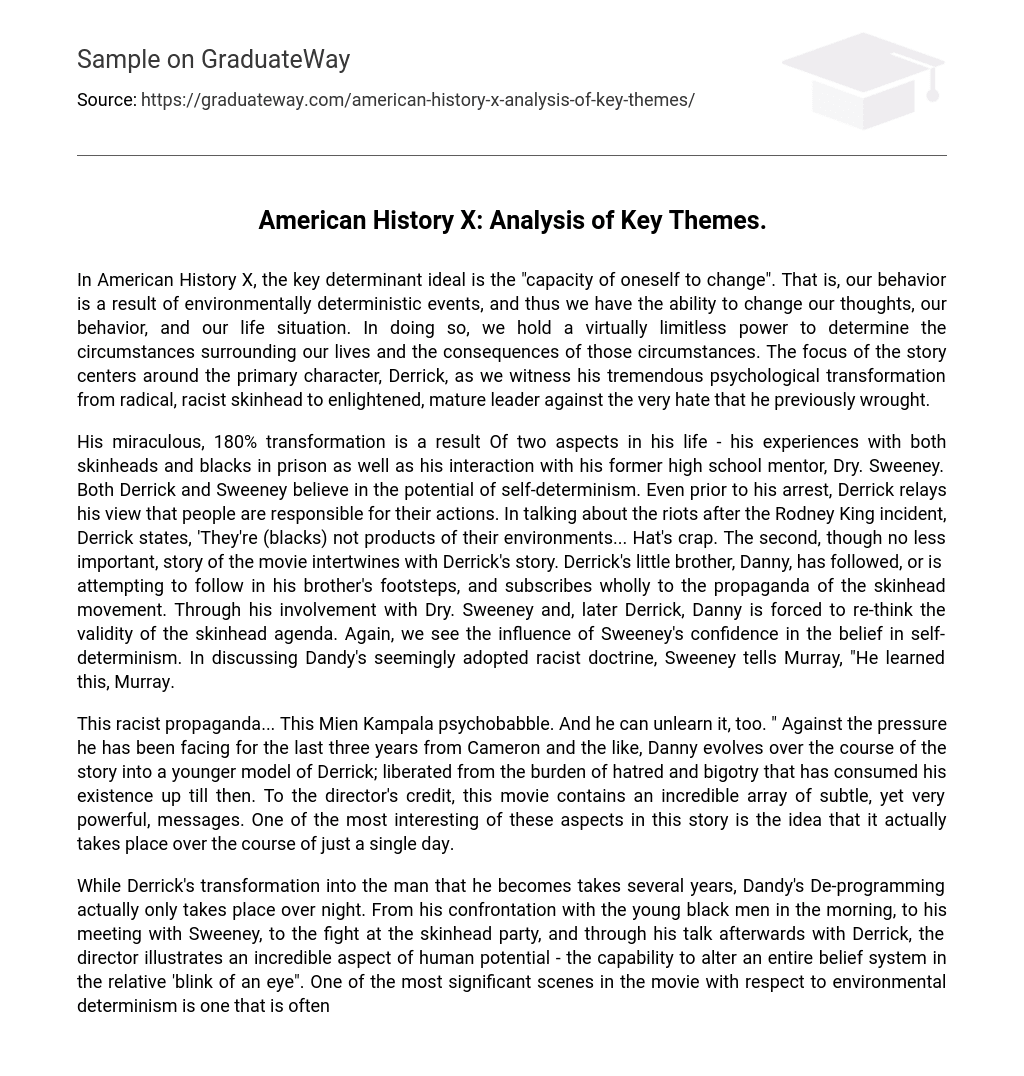The central theme of American History X centers around the belief in the “capacity of oneself to change.” This suggests that external factors and situations affect our behavior, and consequently, we have the capability to modify our thoughts, actions, and life circumstances. By doing so, we possess considerable power in shaping the conditions of our lives and their resulting outcomes.
The story revolves around Derrick’s remarkable psychological metamorphosis: transitioning from a extremist skinhead filled with racism to becoming an awakened and accountable individual who now disapproves of the animosity he once advocated for.
The miraculous transformation of Derrick, which is a result of his experiences with skinheads and blacks in prison, as well as his interaction with his former high school mentor, Dry. Sweeney, is deeply impactful. Both Derrick and Sweeney hold the belief in the potential of self-determinism. Even before his arrest, Derrick expresses his belief that individuals are accountable for their actions. Regarding the riots following the Rodney King incident, Derrick dismisses the notion that blacks are products of their environment, referring to it as nonsense. The second crucial storyline in the film is intertwined with Derrick’s narrative. His younger brother, Danny, has either followed or is attempting to follow in Derrick’s footsteps and fully embraces the propaganda of the skinhead movement. Through his connection with Dry. Sweeney and eventually Derrick, Danny is compelled to reconsider the validity of the skinhead ideology. Once again, we witness the significant influence of Sweeney’s belief in self-determinism. When discussing Danny’s seemingly adopted racist beliefs, Sweeney informs Murray that “He learned this, Murray.”
This racist propaganda… This Mein Kampf psychotherapeutic nonsense. And he can also unlearn it. Against the pressure he has been facing for the past three years from Cameron and similar individuals, Danny undergoes a transformation throughout the story and becomes a younger version of Derrick. He is liberated from the burden of hatred and bigotry that has consumed his life until now. The director deserves credit for including an impressive range of subtle but impactful messages in this film. One of the most intriguing aspects of this story is the notion that it unfolds within the span of a single day.
While it takes several years for Derrick to undergo his transformation into the man he becomes, Dandy’s De-programming occurs overnight. From his confrontation with young black men in the morning to his meeting with Sweeney and the subsequent fight at the skinhead party, the director showcases the remarkable potential of human beings to completely change their belief system in a relatively short time. This ability to alter one’s entire perspective is often underestimated, and it is exemplified in a scene that is often disregarded but holds great importance in terms of environmental determinism.
As Derrick leaves the hewer and gazes at his reflection in the mirror, the scene transitions to a brief glimpse of him and Danny as young children playing on the beach. This specific sequence holds significant power within the film, particularly in its connection to environmental determinism. It evokes a sense of poignant nostalgia as we witness the innocence of the boys during their early years. We witness a young Derrick in awe of a simple seagull, reminding us of a time before the corrupting influences of hatred took hold. In this moment, we share Derrick’s anguish as he realizes the immense amount of time and energy he has squandered on a misguided cause throughout his life.
Perhaps even more so, we feel the overwhelming guilt of realizing the pain and torture he has brought upon those who loved him most. Again to the director’s credit, we experience one of the greatest ironic tragedies in modern film. In seeing and feeling the pressure and turmoil Danny experiences, we (the audience) feel the greatest relief with him as he realizes the error of his ways and puts his resolve down on paper. As the young black man fires upon Danny in the final scene, we feel the great despair in the tragedy of both of their plights.





